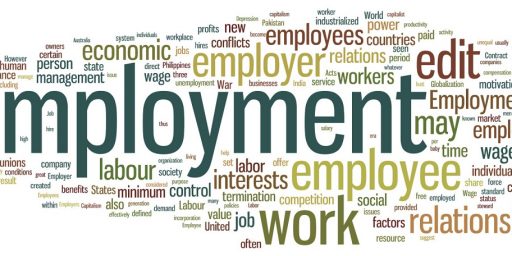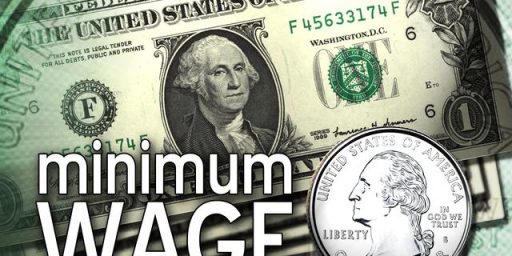Whither Conservative Journalists
 Stacy McCain takes up where Jonathan Martin left off, first explaining why it’s so hard to break in to the paid punditry racket and then focusing on why it’s hard to get conservatives on the just-the-facts reportorial side of the paper:
Stacy McCain takes up where Jonathan Martin left off, first explaining why it’s so hard to break in to the paid punditry racket and then focusing on why it’s hard to get conservatives on the just-the-facts reportorial side of the paper:
The newspaper business is one of the lowest-paying professions in America. Most years, my brother who’s a semi-truck driver in Georgia made more money than I did as an assistant national editor at The Washington Times.
Liberals dominate the newspaper business for the same reason they dominate the fields of education and social work. Liberals are much more willing to do low-wage work that they think “makes a difference.” Conservatives want to make a buck. (I was a Democrat when I started out, which explains how I ended up in the newsprint ghetto.)
If you’re a liberal with good writing skills, you become a journalist. If you’re a conservative with good writing skills, you go to law school.
There’s something to that, I think. Beyond that, though, reporting is becoming increasingly professionalized and therefore it suffers the same problems in this regard as academe: conservatives, especially religious social conservatives, simply don’t fit into the culture very well.





What percentage revenue decline did the NYT just suffer? Why would conservatives want to get on a sinking ship after the liberals have insisted on running it aground?
A better question might be, how does a ship that’s been run aground actually sink?
I agree. It is the same sort of self-selection that the academy suffers from. But the old saw about the good people willing to work for less because they care more is nothing more than rationalizing self-serving claptrap.
It’s hard for such people to break into journalism because “conservatism” as it is defined today has no honest intellectual basis. It is a fact-free fantasy cut loose from its moorings in reality, a moniker adopted by those with a penchant for fabrication and a habit of inserting their own opinions into straight news. Editors expect fact and truth, and if you can’t separate fact from fiction you won’t make your editor happy.
Jeffrey
It’s the liberals that have been caught in fabrications of facts and living in la la land.
If you can’t separate facts from fiction, your readers will leave you in grooves.
Presumably, you have an honest intellectual basis for believing this to be a fact.
Don’t go into journalism.
And therein lies the problem. Journalism isn’t a profession. It’s a craft. It’s a craft with very low costs of entry, lots of people who want to do it, and nowhere near enough jobs for them all. Supply and demand ensures that pay rates will be low.
A couple of generations ago a movement to professionalize journalism really took hold. It hasn’t worked and it won’t work. To understand why just look at the Opinion page of the New York Times. A minority of the columnists, e.g. Bob Herbert, Gail Collins, are trained journalists. If newspapers don’t limit their own membership, who will?
That’s a fair point, although the traditional route to fame and fortune as a pundit used to be working one’s way up from, say, the police beat.
I do think, though, that most reporters and editors these days are college grads, mostly with J-school degrees, and most of those at the more elite institutions have graduate degrees. That has a profound cultural impact.
The higher you go up in the organization the fewer J-school grads you’ll find. So, for example, neither Bill Keller nor Jill Abramson are J-school grads. Check the top positions at all the big newspapers—you’ll find the same thing.
Interesting. Wonder why that is?
Indeed, Keller has decidedly non-elite roots (Pomona College, Dallas Morning News) although he did get a grad degree from Wharton later in his career. Abramson did her undergrad at Harvard but appears to have no graduate degree at all.
I don’t really know. Contacts are more important than credentials?
Pomona is a pretty elite place, James. Small, highly selective, fairly snooty as I recall.
Thanks for the link, James. The point I made about law school nowadays getting the kids with high verbal SAT scores is something I don’t think the poobahs of journalism have given much thought. Every ASNE conference features lots of groaning about the need for more “diversity” in the newsroom, but the obvious fact is, if you’re a minority kid with a 700 verbal SAT, law school is a far more tempting choice than entry-level journalism at $30K/year.
As for ideology, Wayne’s rejoinder to Mr. Baker is right. All the recent major fabrication scandals in journalism — the Stephen Glass scandal, the Jayson Blair scandal, Dan Rather and “Documentgate” — have involved identifiably liberal media outlets. I can think of a handful of plagiarism or conflict-of-interest scandals involving conservative pundit types (e.g., Ben Domenech and Armstrong Williams) but neither of those involved the let’s-just-make-it-up factor that has plagued the liberal MSM in recent years.
Why don’t more conservatives go into education and journalism is a good question. Most of academics is not political. I guess you could turn an accounting or math class into a political exercise, but that is a bit extreme, even in today’s polarized atmosphere. Lots/most journalism is just nuts and bolts reporting. Why isnt that level of journalism split evenly?
The classrooms are already dominated by liberals? Don’t whine, compete. OR, maybe we should have affirmative action for conservatives.
Steve
Exactly, Steve.
Why isn’t the market providing sufficient incentives for high-quality conservative writing? Is there not enough demand for it? Doesn’t this make more sense than blaming collegiate bias – given that there’s relatively little governmental interference with the media in this country?
My God so many of you are clueless.The main steam news bosses will not hire conservative reporters and when they do they hire left leaning reporters.You have no idea what BS!!! conservative reporters deal with. Just take a look at what Fox news has to deal with every single day.All the J schools dominated by HARD CORE leftist.Conservative reporters like to do real reporting but the PC crowd will demonize them if they report negative stories on minorities,gays,female…ect.
“Liberals are much more willing to do low-wage work that they think ‘makes a difference.’ Conservatives want to make a buck.”
Kind of an unflattering view of conservatives on the part of Mr. McCain, isn’t it? (Although quite possibly true.)